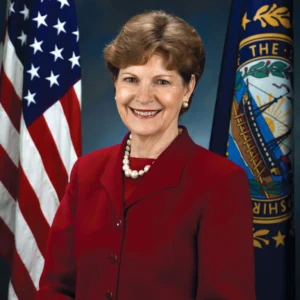Ahead of the 2023 NATO Summit in Vilnius, Lithuania, U.S. Senators Jeanne Shaheen (D-NH) and Thom Tillis (R-NC), co-chairs of the Senate NATO Observer Group, led a letter to President Biden co-signed by Senators Dick Durbin (D-IL), Pete Ricketts (R-NE), Chris Coons (D-DE) and Jacky Rosen (D-NV), reaffirming bipartisan Senate support for the Alliance and outlining the delegation’s vision for successful outcomes.
The letter in its entirety is below:
As members of the Senate NATO Observer Group and with the support of our Senate colleagues, we wish to convey robust bipartisan support for the North Atlantic Treaty Organization (NATO) ahead of your trip to Vilnius for the upcoming NATO Summit. The sovereignty and territorial integrity of Russia’s neighbors, and indeed the whole of Europe, will remain under threat by Vladimir Putin until Ukraine wins the war on its own terms.
Recent developments in Russia highlight instability and growing signs of weakness within Russia’s institutions and its military, validating our shared conviction that Ukraine will win this war. Since the reestablishment of this group in 2018, the Senate NATO Observer Group has demonstrated to our allies and adversaries alike that Congress remains committed to the principles and values which underpin NATO and our collective security. This bipartisan group of Senators supports your efforts to maintain and strengthen transatlantic unity at this critical moment for the Alliance. Ahead of the Summit, we wish to outline our vision for successful outcomes from the Vilnius Summit.
First, we believe that Ukraine should become a member of NATO; therefore, they must be offered a realistic path to NATO membership. Over the past year, Ukraine has proven itself a strong and capable partner. It has fought not only for its own values, but also to protect our shared transatlantic values and Europe’s security. Their sacrifice must be acknowledged with a meaningful package of commitments that bring them closer to joining the NATO Alliance. These commitments must form an achievable path to NATO membership. We support the creation of a NATO-Ukraine Council that offers a formal mechanism for the Alliance’s coordination with Ukraine. We support efforts to help Ukraine reform its military and intelligence structures, in addition to strengthening its democratic institutions, in order to accelerate its membership bid. We hope the Summit will formalize plans to increase interoperability between NATO member states and the Ukrainian military. At the Summit, we urge you to encourage other Allies to also make meaningful commitments to support Ukraine’s ability to defend itself. And we believe that robust security commitments should be on the table to reassure Ukraine of our collective commitment to defend their sovereignty.
Second, in order for the Alliance to support Ukraine’s war against Russia and enable NATO to address our shared challenges, the Vilnius Summit should secure a firm commitment from Allies for an increase in defense spending. The 2015 Wales Summit commitment was intended to push all Allies toward the two percent defense spending commitment. This commitment should no longer be considered optional but mandatory and should be considered the minimum rather than maximum contribution. We recognize that 7 countries have already met that commitment, and others have established plans to meet the two percent target in the coming years.
This is encouraging, but all Allies must recognize the urgency needed to prepare the Alliance to address the current and emerging challenges at hand.
Third, we urge you to work with the leaders of Türkiye and Hungary to secure Sweden’s NATO membership. We hope that both countries will move to ratify the accession protocols ahead of the NATO Summit. If this does not happen, we urge you to partner with all Allies in conveying the implications to our bilateral relations if Sweden’s accession bid continues to be leveraged at the expense of enhancing our collective security by bringing Sweden into the Alliance. The prolonged delay of Sweden’s accession into NATO has become an increased security concern for the Alliance, which only benefits Putin.
Fourth, we hope that the Summit will demonstrate a continued recognition of the multidimensional challenges faced by the People’s Republic of China (PRC). We welcomed the inclusion of the PRC in the 2022 Strategic Concept which acknowledged the challenge that the PRC presents to transatlantic security. China also challenges NATO’s shared values, which have guided the success of the Alliance for more than 70 years. We fully support the consideration of opening a NATO Office in Japan which reflects the strategic need to engage more closely with NATO’s partners to protect our security interests through enhanced coordination. Although we welcome the inclusion of our Indo-Pacific partners at the Vilnius Summit, we hope to see concrete deliverables to deepen our partnerships in response to the varying challenges confronting NATO.
Last, we are pleased to hear that next year’s Summit will be held in Washington, D.C. on the 75th anniversary of the Alliance. We look forward to hosting our Allies in our nation’s capital as we reflect upon the most successful military alliance in world history and continue efforts to strengthen our transatlantic resolve to meet our shared challenges for the years to come.



